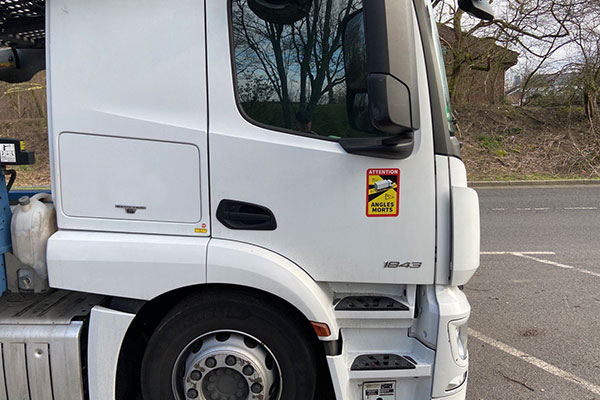Germany relies on modern technology
In Germany, modern technology on a voluntary basis is intended to solve the problem of blind spots on trucks. Pedestrians, cyclists and scooter drivers are to be better protected. And with vigor. For example, there will be no subsidies for the purchase of new trucks unless a turn-off assistant is also installed.
Blind spot marking mandatory in France as of 1.1.21
So while the German driver's cab beeps, his French colleague is busy with the regulations on how to proceed. This is because since the beginning of 2021, there has been an obligation in France to equip vehicles over 3.5 tons with a blind spot marking that is visible from both sides as well as from the rear. And to be affixed by adhesive or magnetic signs. The marking obligation applies not only to trucks (including German vehicles), but equally to all "mobile homes" over 3.5 tons. The warning stickers "Blind Spot" (French: Angles Morts) are available, among other places, at gas stations near the border or from online retailers. Cost approx. 10 euros.

Precise regulations for affixing.
For example, the design and size of the stickers (prescribed height 25 cm, width 17 cm), which must be attached to both sides of the vehicle and to the rear, are officially prescribed. Care must be taken to ensure that the vehicle's license plates and prescribed lettering remain visible. The lighting equipment and the driver's view must also not be obscured. On glass surfaces such as side or rear windows, the blind spot notices are taboo.
The following applies to the rear of the vehicle: the stickers must be attached to the right of the longitudinal centerline at a height of between 0.9 m and 1.5 m from the ground. The side marking must be attached on the left and right within the first meter measured from the front of the vehicle at a height between 0.9 m and 1.5 m from the ground. If this is demonstrably impossible for technical reasons, the marking must be as close as possible to the regulations, up to a maximum height of 2.1 m from the ground.
Transition period until the end of 2021
Incidentally, anyone who disregards the new regulation risks a fine under Class 4 of the French fine system, i.e. up to 750 euros. There is a transition period until the end of 2021. For the time being, drivers will only be asked to pay if they have not affixed a sticker at all. If the warning label does not strictly comply with the new standards, there is usually only a warning, but no fine is due.
Sunday" begins at 10 p.m.
Let's stay a little longer in France and with the driving bans there. Similar to Germany, there is a Sunday driving ban for all vehicles over 7.5 tons. Note, however, that the ban begins at 10 p.m. on Saturdays and ends at 10 p.m. on Sundays. In France, this applies to the entire road network, not just freeways or expressways. It also applies on public holidays. By the way: In France, drivers are not allowed to stay overnight in their vehicles during the weekend rest period. If you do so, you could face heavy fines or even imprisonment. So you should plan your tours very carefully.
Special case Calais
In France, for example, the use of the access roads to and from the port in Calais is regulated separately. For the A16 freeway coming from Belgium, different regulations apply with regard to the Sunday driving ban from France. Vehicles traveling between Belgium and Great Britain are allowed to use this freeway on Sundays and public holidays if they actually use the ferry in Calais.






